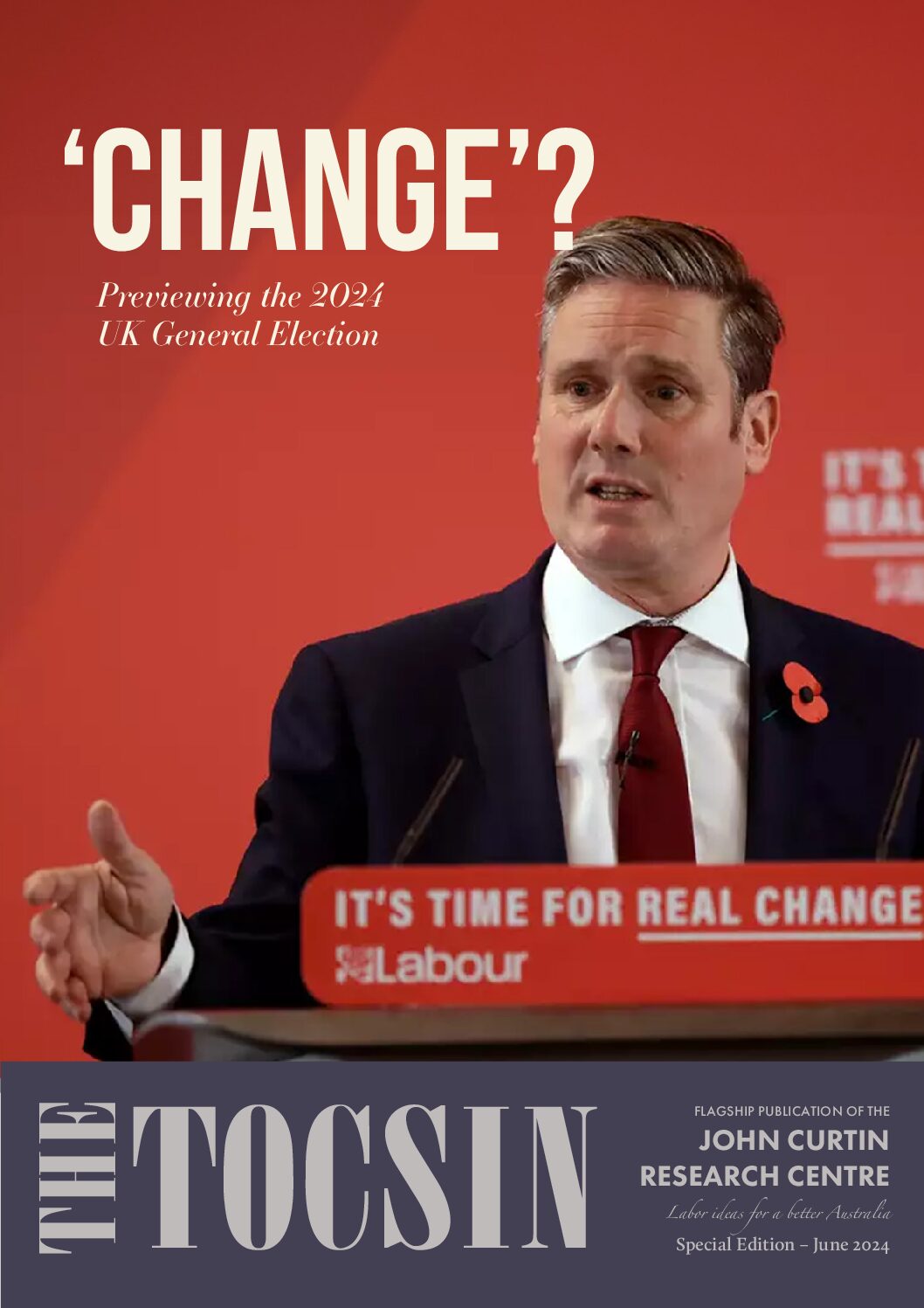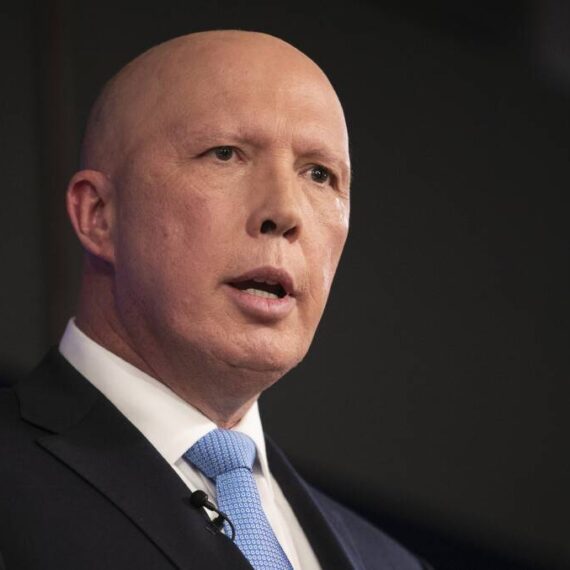The Labor movement is about to secure a historic and tectonic shift in the position of indigenous people in Australia with the forthcoming referendum. I was just so galvanized by Prime Minister Albanese’s speech on election night where it really came out of the blue. His first commitment to implementing the whole Uluru Statement from the Heart, I was not expecting that and his complete forthrightness on the correctness of this referendum and the Uluru Statement has been one of the most amazing things that I’ve witnessed in Labor leadership.
I was an acolyte, and still am, an acolyte of Paul Keating. I was oriented towards Labor in my youth and certainly when I first entered public life, my concentration was on Land Rights, the Mabo decision and Native Title and played a role with Prime Minister Keating and my colleagues from the indigenous leadership across the country in the 90s. So I was a poster boy for Labor side of the struggle. But at the end of the 90s I thought we’ve just suffered a massive loss at the hands of the Conservatives with the response to the Wik High Court decision by the Howard government, the so-called Ten Point Plan that was legislated narrowly in 1998 when Senator Harradine from Tasmania betrayed the Wik people. He had committed to the Wik people to preserve the Native Title Act and the implications of the Wik decision. We suffered a grievous setback when that legislation was passed, because Harradine changed his mind and changed his position. Over the course of the last two decades, indigenous people and native title holders in particular, it is incalculable what was lost as a result of those amendments. The country has gone through probably two waves of the largest resource development revolutions that has taken place across the planet. A massive resource development over these decades since the Wik decision, and yet the ability of native title holders to secure some of that wealth for the landowners on whose land this mining takes place, was severely cruelled by what happened in parliament in 1998, as a result of the Ten Point Plan, so I was shattered at the end of the 90s that we had lost so much. And for a great win like the 1993 Native Title Act and the High Court decision to then lose that or loses significant leverage and power in 1998. I was completely disillusioned and I was, to be honest, disillusioned with the Labor party and its inability to find a way back to office and my despair at those 12 years of Howard’s rule when Labor could not get its act together. It had disowned the Keating heritage. I then had to give thought to the cause of my own people. I came up with the conviction that some of our agenda we needed Nixon to go to China. On the agendas that I had, we needed a conservative Prime Minister to strike out, in relation to issues that I think were very pressing because I’m a strong believer that rights and responsibilities have got to go together, land rights and welfare reform, human rights and social responsibility, and economic development. All of those are not contradictory positions. We have to find the radical center between those positions and in order for our community to rise up out of the hole that we’re in. So I’ve been an advocate for Alcohol Management and as much as I have been concerned about imprisonment and incarceration of our people. But in that process, I think I lost progressives. I don’t think I was successful in trying to explain what our strategy was.
And so there was an assumption by my friends in the Labor movement that somehow I’d gone over to the dark side, the conservatives. But I’ll tell you what, in 2007, Howard went to his last election with a commitment to constitutional recognition. The ball was finally kicked off on this by a conservative who committed that within 18 months of him being reelected he would take a question to the Australian people in a referendum.
Now, Howard’s thinking at the time was that he wanted a change to the preamble to the Constitution. I recall him literally on the eve of him announcing his election commitment, I recall having a fairly tense phone call with him about my view, that simple preambular recognition would be insufficient and unacceptable, there needed to be substantive recognition in the Constitution. Howard committed at the time that we would revisit this if he got reelected, anyway, there was no chance. Kevin Rudd mirrored John Howard’s commitment; he said I will do the same thing. And then, two days before the election, he announced that constitutional recognition would be an agenda for his second term, so the basically the commitment to constitutional recognition was put on the back burner until the second term of a Rudd government. And that second term never came, of course.
So this whole issue was, had been enlivened by Howard in 2007, the ball had been kicked into play but then it kind of sat there for those first three years, and it was only in the negotiations by Julia Gillard to form the minority government that she did that a commitment to picking up recognition commitment commenced. So Gillard formed the Expert Panel in 2011 and I was a member of that and that is a time that I had the good fortune to have a young intern from Monash Law School join me on this, what is now a 13 year agenda. The set of ideas that emerged in that Expert Panel process, did not include the main idea, the most substantive idea was a commitment to non-discrimination, that there would be a provision of the Constitution that would outlaw discrimination against any group in the Australian community. But when the report was released at the end of 2011, there was a violent reaction to those recommendations, particularly to the non-discrimination proposal, by constitutional conservatives who said this would be a one-line Bill of Rights. The proposal would amount to this dreaded Bill of Rights provision that would empower Courts and particularly the High Court to supervise the laws of Parliament, according to judgments around discrimination. The reaction was just so violent and so determined that Shireen and I soon came to the view that there was no way those proposals from the Expert Panel would survive. We started casting around for a pivot, an alternative. I decided for Shireen and I to go across the North Shore of Sydney and sit down with the Australian Catholic University people, Professor Craven, Julian Leeser and Professor Anne Twomey. We sat down with them and we put it to them, if you are going to object to a nondiscrimination clause in the Constitution, indigenous people have suffered and still suffer from discrimination. How are you going to assure them that they can be treated fairly in the future?
So the concept that indigenous people should have a voice to the Parliament, rather than having the shield of the law, we would have the sord of the voice and we could point out to Parliament, our views on laws and policies before they are made. That really was the origins of the idea of the voice, It would be a political mechanism, a mechanism for indigenous people to participate in the democratic politics of the country and to advise parliament on bills affecting indigenous people, but also to advise the executive government on the policies and programs that affect indigenous people.
The process over this last decade has been around the building of an indigenous consensus around the voice. The 2017 Uluru Statement from the Heart was the high watermark of self-determination in my view, there’s never been anything like the rigor and the participation that eventually resulted in the Uluru Statement after dialogue meetings were held in locations all around the country from the Torres Strait to Tasmania, Western Australia to Central Australia. All corners of the country were covered by these dialogues and the resulting Statement from the heart at Uluru, the extraordinary consensus that was achieved there. I’ve certainly not participated or witnessed anything near the amount of thought rigor, debate discussion that went into the formation of the Uluru Statement.
This has been a long process, I know of no other policy, or constitutional proposal, or legislative reform that has been subject to as long and involved a process as this. This has been going on for 12, 13 years now. If you count back to when it was first kicked off by Howard, we are entering the 16th since this process was started. At every turn, the potential objections that constitutional conservatives could raise against the proposal at every turn, we have sought to anticipate them and to make provision to address the concerns they have. The arguments that have been thrown around in the last year in particular, are really baseless because the questions I raised have actually already been answered. We have had a number of High Court judges contribute to reviewing the provision that the Prime Minister has announced and which the Attorney General has now introduced into the parliament and which is now the subject of the parliamentary committee process. The extraordinary thing about the process we’re going through now, the debate and the truculent lies that are being generated by the No campaign, the extraordinary thing is that Julian Leeser was as much an author of the provision as anyone in the country. When the story is probably told about this history, Julian will be seen as one of the architects of the concept of the Voice. I can tell you that, and I won’t go on too much longer, I can tell you that every Prime Minister I’ve dealt with, from Abbott in 2013 and then Turnbull and then Morrison, they all went to the various elections with a policy commitment to indigenous constitutional recognition. There’s never been an election where the two major parties have not been committed to constitutional recognition of Indigenous Australians since 2007. This has been a consistent commitment, and indeed in the 2019 election, Morrison went to that election with a commitment that included setting aside a significant budget, $170 million, to conduct the referendum. Morrison went to the 2019 election with a referendum budget in forward estimates.
This gulf between what the leadership of the conservatives was committed to versus their inability or their cowardice, in terms of getting their party room into order, and to lead their party room forward, was the reason why the politics of this was courted for so long. Abbott wanted to do this, but he couldn’t. Turnbull wanted to do this, but he couldn’t. Morrison wanted to do this, but he couldn’t. They were all looking over their shoulders, in the case of Turnbull; he was looking over his shoulder at Abbott coming for him again.
Abbott wanted to use any kind of commitment that Turnbull might make, to going forward with constitutional recognition as a motivation to cut his throat.
It’s been the inability of the conservative leadership to bring their party room with them that has been the fundamental problem the conservatives have had, and they still have it now, Dutton has got an intransigent party room, he’s too weak to have shifted them and shown the necessary leadership to move his party out of the rut that it’s in.
I am of the great belief that we are in a good position. I think we can carry this, I think the Australian people will say, Yeah, that’s a fair deal. That’s a fair deal. That’s a decent deal. This is the least, this is a simple proposal. It’s a profound proposal, but it’s simple and it’s just. I have a great belief that the referendum will succeed when it is put to the people in October. But the headwinds and fractiousness of the No campaign and the sheer difficulties we’re having in from the media, it’s just extraordinary the uphill battle, the work that we have cut out for us. But in the final analysis my view is that we’re on a winner here, I just urge the Labor movement to stay the course, let’s complete this, let’s convince our fellow Australians about the correctness of this cause and let’s bring this home in October.





